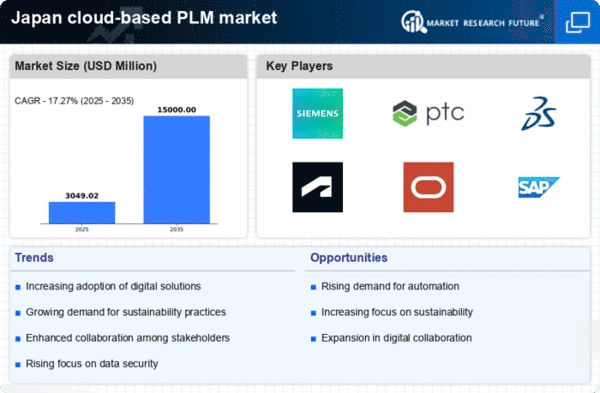Emergence of Industry 4.0 Technologies
The advent of Industry 4.0 technologies is significantly influencing the cloud based-plm market in Japan. As manufacturers increasingly adopt smart technologies, the integration of cloud-based PLM systems becomes vital for managing complex product data and processes. The convergence of IoT, AI, and big data analytics is reshaping how products are designed, developed, and maintained. Reports indicate that approximately 60% of manufacturers in Japan are investing in Industry 4.0 initiatives, which inherently require advanced PLM solutions. This trend suggests that the cloud based-plm market is poised for growth as companies seek to leverage these technologies to enhance operational efficiency and innovation.
Rising Demand for Digital Transformation
The cloud based-plm market in Japan is experiencing a notable surge in demand driven by the ongoing digital transformation across various industries. Companies are increasingly recognizing the need to modernize their operations to remain competitive. This shift is reflected in a reported growth rate of approximately 15% annually in the adoption of cloud-based solutions. As organizations seek to streamline processes and enhance efficiency, the integration of cloud-based PLM systems becomes essential. This trend is particularly evident in sectors such as manufacturing and retail, where the ability to manage product lifecycles digitally is crucial. The cloud based-plm market is thus positioned to benefit significantly from this digital shift, as businesses invest in technologies that facilitate innovation and agility.
Expansion of E-commerce and Online Retail
The rapid expansion of e-commerce and online retail in Japan is significantly impacting the cloud based-plm market. As consumer preferences shift towards online shopping, companies are compelled to enhance their product development and management processes to meet the demands of digital consumers. The cloud based PLM systems enable businesses to streamline their product offerings and improve time-to-market, which is essential in the fast-paced e-commerce environment. Recent data indicates that e-commerce sales in Japan have grown by over 20% annually, further driving the need for efficient product lifecycle management. Consequently, the cloud based-plm market is likely to thrive as organizations seek to optimize their operations in alignment with the evolving retail landscape.
Growing Need for Agile Supply Chain Management
The cloud based-plm market in Japan is being propelled by the increasing necessity for agile supply chain management. As businesses face fluctuating market demands and global competition, the ability to respond swiftly to changes is critical. Cloud-based PLM solutions facilitate real-time collaboration and data sharing among supply chain partners, enabling organizations to adapt quickly. It is estimated that companies utilizing cloud-based PLM systems can reduce time-to-market by up to 30%. This agility is particularly crucial in industries such as fashion and electronics, where trends can change rapidly. Thus, the cloud based-plm market is likely to see continued growth as firms prioritize flexibility and responsiveness in their supply chain operations.
Increased Focus on Data Security and Compliance
In Japan, the cloud based-plm market is witnessing a heightened emphasis on data security and regulatory compliance. As organizations migrate to cloud-based solutions, concerns regarding data breaches and compliance with local regulations have become paramount. The Japanese government has implemented stringent data protection laws, compelling companies to adopt robust security measures. This has led to a growing demand for cloud based PLM solutions that offer advanced security features and compliance capabilities. It is estimated that around 70% of businesses prioritize security when selecting cloud-based services. Consequently, the cloud based-plm market is adapting to these requirements, ensuring that solutions not only enhance productivity but also safeguard sensitive information.
















